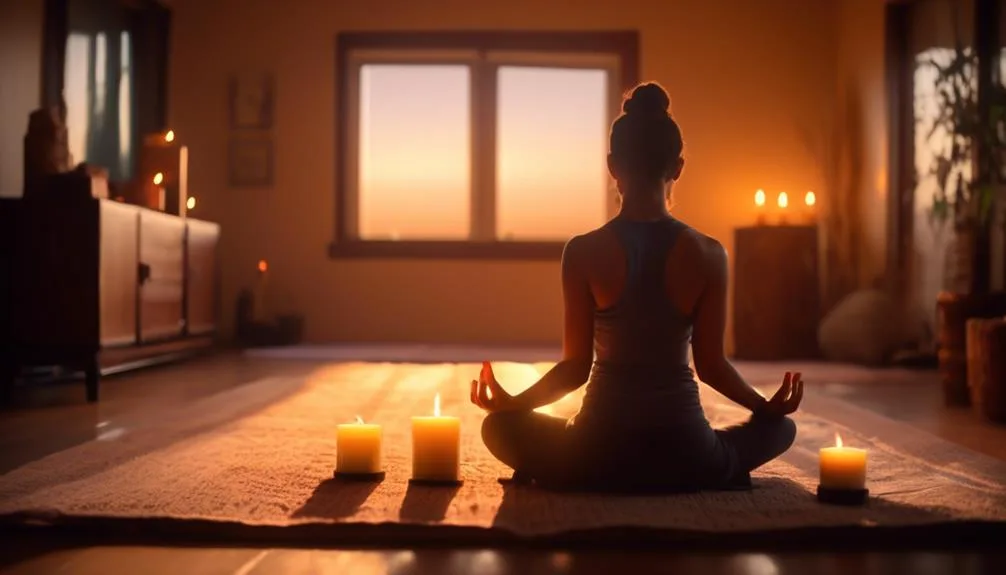How Many Times Should You Meditate a Day
Did you know that about 14% of US adults have tried meditation at least once? It's a practice that's gaining traction, and with good reason – meditation is known to reduce stress, increase focus, and promote overall well-being.
But when it comes to how often you should meditate, there's no one-size-fits-all answer. It's a topic of much debate, influenced by factors such as your lifestyle, personal goals, and even your level of experience in meditation.
So, if you're keen on exploring the optimal frequency of meditation for your unique circumstances, you're in the right place. Let's embark on this insightful journey.
Key Takeaways
- Meditation techniques are designed to guide individuals towards inner peace and self-discovery.
- Regular meditation practice provides numerous mental health benefits and helps individuals handle life's challenges with greater ease.
- The frequency of meditation varies from person to person and can be influenced by lifestyle, goals, and barriers.
- Different goals may require different meditation frequencies, and it's important to find the balance that works for you.
Understanding the Basics of Meditation

Before diving into the beautiful journey of meditation, it's crucial to grasp its basic principles and techniques.
Meditation techniques, such as focused attention or open monitoring, aren't designed to be complex, but rather, to guide you towards inner peace and self-discovery. They allow you to quiet the noise of your daily life, focusing your mind and promoting a state of serenity.
The benefits of mindfulness are profound. Regular practice can reduce stress, enhance emotional balance, and even improve physical health. It's your key to freedom, allowing you to live in the present, unencumbered by past regrets or future anxieties.
The Importance of Regular Meditation

Having grasped the basics of meditation, it's now essential to understand the significance of incorporating this practice into your daily routine.
Regular meditation provides numerous mental health benefits, acting as one of the most powerful stress reduction techniques. As you continue meditating, you'll likely notice a shift in your perspective. Stressful situations won't rattle you as much, and you'll be better equipped to handle life's ups and downs.
It's like you're building a mental fortress, protecting your mind from negative thoughts and emotions. So, in your journey towards freedom, never underestimate the importance of regular meditation.
It's more than just a habit; it's a lifeline that keeps you anchored amidst the choppy waters of life. Real freedom begins within, and meditation can lead the way.
Factors Influencing Meditation Frequency

Now that you're on board with regular meditation, let's peel back the layers on what influences how often you should meditate.
The frequency of meditation is highly personal and varies from individual to individual. Some of the key factors include your lifestyle, personal goals, and meditation barriers such as time constraints or lack of a quiet space.
Incorporating personalized meditation into your daily routine can help overcome these barriers. You're free to set your own pace, choose a method that suits you, and decide when and where you meditate.
Remember, it's not about quantity but quality. Even a few minutes of focused meditation can bring significant benefits. Keep exploring and adjusting until you find what works for you.
Embrace the journey!
Ideal Meditation Frequency for Different Goals

Understanding your specific goals can guide you in determining the ideal meditation frequency that fits your needs. If your goal is stress reduction or better sleep, daily meditation might be ideal. For deeper self-awareness, you might need to meditate twice a day.
Goal setting is crucial to tailor your meditation styles and frequency. For instance, mindfulness meditation may suit those seeking a calmer mind, while transcendental meditation could help in achieving a higher state of consciousness. Remember, meditation isn't a one-size-fits-all approach. It's about finding the balance that works for you.
Tips for Incorporating Meditation Into Your Routine

Incorporating meditation into your routine could seem daunting at first, but with a few practical tips, you'll find it easier than you think.
Here are some ways to make meditation a natural part of your day:
- Time allocation: Dedicate specific time slots for meditation. It could be early in the morning or before bed. Consistency is key.
- Set reminders or alarms to keep you on track.
- Start small, maybe 5 minutes a day, and gradually increase.
Meditation tools: Utilize tools that can help you focus and relax.
- Guided meditation apps or videos can be very helpful.
- A quiet, comfortable space is also a must-have.
Frequently Asked Questions
What Are Some Common Mistakes Beginners Make When Starting Meditation?
You're often prone to meditation posture errors and misinterpretation of mindfulness when starting out. Don't rush, remember it's a journey. Embrace silence, maintain a consistent posture, and truly understand mindfulness for effective meditation.
How Long Should Each Meditation Session Last?
There's no hard and fast rule. Starting off, aim for 5-10 minutes per session. As you gain comfort with meditation techniques and feel the benefits, you'll naturally want to increase your time. Keep it flexible!
Can Meditation Replace Traditional Medical Treatments for Stress and Anxiety?
While meditation can significantly aid in stress and anxiety management, it shouldn't completely replace traditional treatments. Consider it as part of holistic healing approaches, complementing, not substituting, medication. Balance is key to your wellbeing.
Are There Certain Times of the Day That Are Better for Meditation?
You're wondering about optimal meditation periods. Interestingly, meditation timing benefits aren't strictly time-related. It's more about consistency. However, many find early mornings or evenings ideal for a calm, undisturbed experience. Find what works best for you.
How Can I Maintain Concentration During Meditation?
To maintain concentration during meditation, you'll need to practice specific meditation techniques. You can improve focus by using methods like mindful breathing or body scan meditation. Keep practicing, you're on the path to freedom.
Conclusion
As you journey through life's ebbs and flows, remember, the key to effective meditation isn't about clocking countless hours, but consistency. Whether it's once or twice a day or every other day, find your rhythm.
Imagine your mind as a serene lake, with meditation clearing the ripples of stress and distraction. Keep exploring, keep meditating. It's your secret sanctuary, your gateway to peace.
Keep that door open, it's a game-changer in your pursuit of wellbeing.






